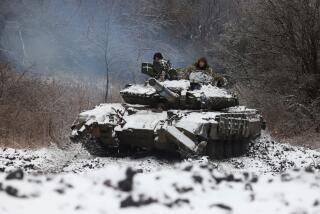Can Lebed Ride His Apparent Success in Chechnya to Ever Greater Glory?
- Share via
HUNTSVILLE, UTAH — The apparent end of the war in Chechnya, brokered by Gen. Alexander I. Lebed, clearly marks a watershed in the bloodiest chapter in Russia’s post-communist era. The media will rush to hail the charismatic general’s achievement and all but anoint him the heir apparent to ailing President Boris N. Yeltsin. Indeed, after the agreement was announced in Khasavyurt, Russia, a crowd could be heard exclaiming, “Lebed for president.”
But, as is often the case in Russia, appearances can be deceiving. The framework agreement negotiated by Lebed and the rebel military leader, Aslan Maskhadov, is no doubt fragile. Reportedly, it offers Chechnya a greater degree of autonomy in exchange for the Chechens suspending their independence demand for five years, at which time Russia vows to address the issue head-on.
At first look, the declaration worked out between Lebed and the Chechen rebels has enough attractive features for both sides to make it work. For Yeltsin, it would provide a respite from the Chechen imbroglio, in that it delays its ultimate resolution until after he would have served his full second term. For the Russian people, just about any outcome that would stop the fighting is more than welcome, even if there is little love lost for the chechensi (a synonym for gangsters in colloquial Russian). It is still not well understood in the West that, for many Russians, the war in Chechnya has become, to use Yeltsin’s metaphor, a “festering wound,” a national trauma surpassing that of Afghanistan. Official estimates are that more than 30,000 Russians, military and civilian, have lost their lives in the 20-month war, nearly three times the official casualties sustained in the decade-long Afghan war.
For the Chechen rebels, the peace plan represents a de facto Russian admission of military defeat and the Kremlin’s tacit surrender of military and political control over much of Chechnya’s territory. It also seals the fate of Moscow’s Chechen puppet regime, led by Doku Zavgayev, and clears the way for the political takeover of the country by the rebels.
Despite these seemingly powerful arguments for the success of Lebed’s settlement, there are several reasons to doubt its long-term durability. To begin with, the two sides’ positions on the fundamental question of Chechnya’s ultimate political status are diametrically opposed. Moscow now seems willing to grant the Chechens just about anything short of total independence and secession from Russia, but the attitudes of the Chechen rebels have hardened to the point that they may consider nothing short of what the Kremlin loathes to give them when the five-year deadline comes up. Yet, no Russian president can afford to give in on that point, simply because of the pervasive, historical fear among Russians that setting such a precedent, even for a tiny enclave like Chechnya, would have a domino effect leading to the disintegration of the country.
Ironically, the uncompromising attitudes of the rebel leadership may become a point of contention among Chechen cities and tribal leaders themselves and easily transform into bitter internecine conflict. Already, there are notable differences between those who believe that Chechnya faces a dismal future without Russian economic aid and investment and those who don’t want anything to do with Russia, regardless of the economic price. The agreement reportedly establishes a joint commission to, among other things, work out proposals for economic recovery. There is also the delicate matter of dealing with the significant number of Chechens who collaborated with the Russians and the puppet regime, in a society where tribal loyalties are paramount.
Of more immediate concern will be efforts to torpedo the fragile peace pact. There is little doubt, for example, that for many in the Russian top brass, Lebed’s deal with the rebels is, at best, a humiliating surrender and, at worst, a betrayal. These people would certainly not mind another chance to practice their craft on the Chechens. The recent threat by the Russian commander, Gen. Konstantin B. Pulikovsky, to carpet-bomb Grozny and its inhabitants may or may not have been seriously considered, but the general’s sense of humiliation and frustration is such that at least some in the army would welcome an opportunity to go back on the attack. Visceral hatred and a desire for revenge are, if anything, even stronger on the Chechen side.
As for Lebed, there is little question that, by essentially conceding military defeat, Lebed may have somewhat undermined his standing in the military and security establishments, his power base. Many of his supporters in the military have not forgotten that, only months ago, Lebed publicly accused Yeltsin of betraying the army by not pursuing victory.
There are also signs that Yeltsin may be quite consciously trying to cut the general down to size, despite the obvious importance of Lebed’s mission in Chechnya. Should the agreement collapse, and Lebed’s bold claim that “the war is over” prove hollow, Lebed would be a convenient fall guy.
In any case, one can only hope that Chechnya will underscore, for leadership and people alike, the need for greater decentralization and genuine federalism if Russia is to become a successful democracy.
More to Read
Sign up for Essential California
The most important California stories and recommendations in your inbox every morning.
You may occasionally receive promotional content from the Los Angeles Times.













